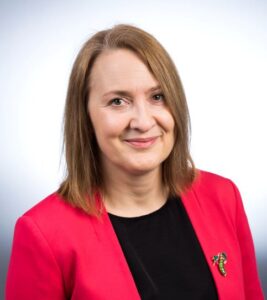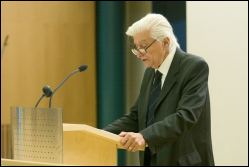Wir freuen uns über viele spannende Bewerbungen, die wir für unsere forschungsorientierten Masterstudiengänge "Politik- und Demokratieforschung" sowie "Politische Ökonomie und Internationale Beziehungen" erhalten haben. Die fachliche Prüfung durch uns ist jetzt abgeschlossen, und das Studierendensekretariat der JGU wird bald damit beginnen, die Zulassungsbescheide zu erstellen. Da dies zentral für die ganze Universität geschieht, kann dies nach unserer Erfahrung eine Zeitlang dauern. Deshalb bitten wir noch um etwas Geduld.
Autor: arzheim
MA-Bewerbungen: Fachliche Prüfung abgeschlossen
Gastvortrag "Friendly foes or enemies within?" mit Marcel Lewandowsky
Am 10.07.2024, 18 Uhr s.t. spricht Marcel Lewandowsky im Institutskolloquium in Raum GFG 01-721 zum Thema Friendly foes or enemies within? Assessing the (in)stability of coalition governments with populists in Europe. Alle Interessierten sind herzlich eingeladen!

Abstract: Do populist parties in government have an impact on government stability? In this paper, we argue that cabinets including populists are more likely to end prematurely because of the populist nature. This includes leadership-centrism, internal conflict and lack of willingness to compromise due to their anti-elite attitude. We test this claim by examining 26 Western and Central Eastern European countries between 1990 and 2021. Even when controlling for the most common factors influencing government stability, populism is the main factor contributing to a cabinet’s termination. Whereas this finding applies to government stability in general, populism does not contribute to earlier termination in countries where populist governments are common. These findings have important implications for our understanding of the effect of populism as well as the circumstances under which populists come to power.
Zur Person: Marcel Lewandowsky ist Privatdozent an der Bundeswehr-Universität Hamburg und seit Sommersemester 2024 Lehrbeauftragter an der Universität Mainz. Seine Forschungsschwerpunkte liegen auf dem internationalen Vergleich von Demokratien, Parteien und Populismus. Zuletzt veröffentlichte er in European Political Science Review und Representation. Im Mai 2024 erschien sein Sachbuch „Was Populisten wollen“ im Verlag Kiepenheuer & Witsch.
Einladung zum Gastvortrag: "How Leaders Portray Themselves on Social Media Images" mit Nils Weidmann (Konstanz)
Am Mittwoch, den 29.05. 18 Uhr s.t., (GFG 01-611) ist Nils Weidmann (Universität Konstanz) zu Gast im Institutskolloquium und spricht zum Thema "How Leaders Portray Themselves on Social Media Images".
Abstract:
While traditional political communication is often mediated by news coverage, social media platforms allow leaders to circumvent news gatekeepers to raise their profiles and directly communicate with citizens. For this purpose, visual material has been shown to be very effective. However, the incentives for leaders to visually present themselves on social media and as a result, the images they choose for publication, are likely to differ by regime type. Democratic leaders should be more likely to emphasize social aspects and to be more inclusive, but at the same time should be less likely to present themselves in the images they post. We test these expectations using a large new data collection of images posted by a global sample of political leaders on social media. Using computer vision techniques, we extract information on the image content, in order to analyze differences in this content between democracies and autocracies.
Nils Weidmann hat Informatik an der Universität Freiburg und Politikwissenschaft an der ETH Zürich studiert, wo er 2009 auch promovierte. Seit 2015 ist er Professor für Politikwissenschaft und Leiter der Forschungsgruppe "Communication, Networks and Contention" an der Universität Konstanz. Zuvor war er Postdoc am Centre for the Study of Civil War, Peace Research Institute Oslo (2011-12), am Jackson Institute, Yale University (2010-11), und an der Woodrow Wilson School, Princeton University (2009-10).
Mainz ist eine der Stationen auf seiner diesjährigen Bike & Talk Tour
Spitzenplätze für die Mainzer Politikwissenschaft im CHE-Ranking
Im jüngsten CHE Ranking erreicht die Mainzer Politikwissenschaft jeweils sehr gute Werte bei den beiden Hauptkriterien "Allgemeine Studiensituation" und "Studienorganisation". Wir danken den Kolleginnen und Kollegen aus dem Studienbüro und der Studienberatung, die dies jeden Tag möglich machen!
Professor Dr. Michael Becker verstorben
Mit Bestürzung haben wir erfahren, dass unser Würzburger Kollege Prof. Dr. Michael Becker überraschend verstorben ist.
Michael Becker hat 1991 an unserem Institut mit einer Arbeit zu Jürgen Habermas und Ronald Dworkin promoviert und war bis 1994 Wissenschaftlicher Mitarbeiter in der Abteilung Innenpolitik und Politische Soziologie. Auch danach blieb er unserem Institut und vielen Kolleginnen und Kollegen verbunden.
Unsere Gedanken sind bei seiner Familie und seinen Angehörigen.
Gastvortrag "Dichotomous politics: Partisanship, affective polarisation and populism"
Am 15.05., 10-12 Uhr, Raum 02-601 ist Professor Dr. Steven van Hauwaert (Forward College, Paris) zu Gast im Kolloquium der Abteilung Innenpolitik und Politische Soziologie. Professor van Hauwaert arbeitet vor allem zu Themen im Bereich Populismus und Einstellungen zur Demokratie. Um beides wird es auch in seinem Vortrag gehen. Alle Interessierten sind herzlich eingeladen!

Abstract
Populism is one of the more persistent challenges to democracy. From polity-level research, we know that the simplification, or dichotomisation, of politics can bolster populism. The question remains to what extent this is also true on the individual-level. We argue two important dynamics have been neglected when examining
populist support, namely partisanship and (affective) polarisation. Like populism, both dynamics view politics in a dichotomous and simplistic manner. This study posits that such an interpretation of political life is beneficial for populists. We rely on an original 2019 survey fielded in 10 West European countries to examine how dichotomised views of politics feed into populist support. We find that populist attitudes, positive partisanship and affective polarisation stimulate populism, whereas negative partisanship curtails it. At the same time, the relationship between affective polarisation and populist support is also more conditional on other party characteristics, like ideology, but not others, like governmental status.
Einladung zum Gastvortrag: Keeping Workers Off the Ballot: How Electoral Democracy Undermines Working-Class Representation
Am 24.04., 18 Uhr s.t. im Raum GFG 01-721 ist Professor Dr. Noam Lupu (Vanderbilt) zu Gast im Institutskolloquium. Alle Institutsmitglieder (und insbesondere auch die Studierenden) sind herzlich eingeladen! Es geht um die nachteiligen Folgen der Unterrepräsentation von Arbeitenden für die Demokratie.
Bio: Noam Lupu is Associate Professor of Political Science at Vanderbilt University, the Associate Director of the LAPOP Lab, and also a Fellow at the American Academy in Berlin. His research interests include comparative political behaviour, political parties and partisanship, congruence and representation, legacies of political violence, and class and inequality.
Abstract: In most democracies, politicians are economically better off than the citizens they
represent: they are wealthier and more educated, and almost none of them come from
the working-class occupations that make up majorities of most labor forces. These
inequalities in the makeup of government in turn appear to have significant
consequences for economic policy. But no one really knows why so few working-class
people go on to hold public office in electoral democracies around the world. We
argue that electoral democracy itself has unique, built-in biases that discourage
working-class people from going on to hold office. We draw on dozens of original
surveys in the Americas; interviews with party leaders in Africa, Latin America, and
Scandinavia; and the first-ever global database of information on the occupational
backgrounds of national legislators in the world's democracies. With these data, we
argue that standing for elected office in any democracy is a burden that requires a
person to give up precious resources: time, energy, and certainty about the future.
As a result, relatively resource-poor social groups, like the working class, are
simply less likely to be able to run or to win office. These burdens also make
working-class people less appealing to the party leaders and other institutional
gatekeepers who could, in principle, help working-class people get into office. The
conditions necessary for workers to hold office in large numbers are truly
extraordinary: in rare cases, parties, interest groups, and labor unions have
strategic or ideological reasons to target and subsidize working-class candidate
entry, but outside of these unusual political moments, working-class representation
is typically low or close to zero in democracies. Scholars and practitioners often
think of descriptive representation as fluid, or that it might even exhibit positive
feedback, but we argue that the basic operation of electoral democracy builds in
disadvantages for working-class representation.
Einladung zum Gastvortrag: The role of racial attitudes in Brexit and post-Brexit Britain: ethnic minority voters
Interessierte, die vom Lokführerstreik betroffen sind, können die Präsentation auch im Stream verfolgen: https://bbb.rlp.net/rooms/arz-fk3-sjo-tm5/join
Alle anderen kommen bitte ins GFG, denn live sind Vorträge schöner!
Am 24.01.24 um 18:15 Uhr in Raum GFG 01-611 ist Professor Dr. Maria Sobolewska (University of Manchester) zu Gast im Institutskolloquium. Alle Institutsmitglieder (und insbesondere auch die Studierenden) sind herzlich eingeladen! Es geht um die Rolle ethnischer Minderheiten in Großbritannien, vor und nach dem Brexit-Referendum.

Abstract:
Race is a new electoral cleavage in most Western Democracies, and while we have a growing understanding how attitudes towards race from white majorities shape their voting behaviour, we still know relatively little what drives the distinct voter preferences and behaviours observed among voters who self-identify as non-white minorities. The causes of this distinct behaviour are mostly assumed and rarely subject to empirical testing, due to a lack of suitable data in many countries. The guiding assumption has been that behind ethnic minorities' overwhelming support for the liberal-left lay a rejection of the ethnocentric right-wing or conservative options, which racialised minorities found threatening.
However, the 2016 EU Membership Referendum in the UK brought an interesting counter-point, by showing that minority voters can opt for ethnocentric voting choices: more minority Britons voted to Leave after an aggressively anti-immigrant campaign than ever chose to support the Conservative party in usual elections. Using two original surveys of ethnic minority voters in Britain we analyse in depth their attitudes towards race and the role it plays in their life, and how these attitudes explain voting behaviour in the 2016 Referendum and in subsequent elections.

Wir trauern um Professor Dr. Ernesto Garzón Valdés
Das Institut für Politikwissenschaft trauert um

Einladung zum Gastvortrag: "Digitalising Democracy: Who wants to use i-voting and why?"
Am 06.12.23 um 18 Uhr s.t. in Raum GFG 01-611 ist Professor Felix-Christopher von Nostitz (Lille) zu Gast im Institutskolloquium. Alle Institutsmitglieder (und insbesondere auch die Studierenden) sind herzlich eingeladen!
Digitalising Democracy: Who wants to use i-voting and why?
Since the early 2000s, internet voting (i-voting) has become one of the main tools in the digitalisation process of democracy. Several countries, such as Estonia or Switzerland, have been using i-voting over the past twenty years. But there is still limited research that examines citizens' expectations towards the use of technology in the electoral process, particularly in countries that have not yet introduced online voting.
The aim of this talk is to help fill this gap. By studying the opinions of citizens about online voting, we question existing preconceptions about their propensity to accept such a voting system. We develop our empirical analysis by focusing on a case study, France. Based on a post-electoral survey we show that French citizens are broadly in favour of the introduction of online voting. The rejection of such a system is above all related to political reasons and the non-positioning on the issue reflects the social divide traditionally observed in electoral and online political participation. Secondly, we show that different groups stand out, depending on the arguments they use to support or oppose the introduction of online voting.
Who is our guest?
Felix-Christopher von Nostitz earned his Ph.D. from the University of Exeter in 2017. He presently is an Associate Professor at ESPOL - European School of Political and Social Sciences, Université catholique de Lille. His current research interests are on political participation, parties and elections in the digital age. He is part of the Steering Committee of the Digital Parties Research Network. He was and is involved in various research projects on elections, voters and the digital transformation of politics and society, such as the H2020 projects ActEU and RECONNECT, People2022, Comparative Candidate survey project and “Smart Lille” exploring citizens perceptions of smart cities. He recently published in Revue Française de Science Politique, Comparative Migration Studies and Party Politics.





